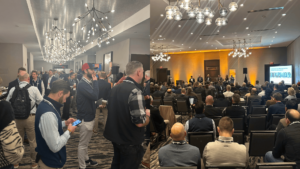
My name is Kevin Birenbaum and I am a senior at the College of the Holy Cross, majoring in International Studies. I first became interested in commercial real estate during my freshman year through the Real Estate Club where I also had the chance to connect with many of our incredible alumni in real estate. I interned at a boutique real estate investment shop called The Revival Companies after my sophomore year, and had the chance to intern at Taurus Investment Holdings, as an Industrial Acquisitions intern, after my junior year. As Co-Chair of the Real Estate Club, I’ve helped strengthen the student-alumni connection and deepen our campus engagement. Attending the 2025 Worcester State of the Market was the perfect opportunity to learn more about the city’s growing real estate landscape and see its exciting momentum firsthand. On October 30, 2025, Bisnow hosted a Worcester State of the Market event, bringing together developers, investors, and public officials to explore how Central Massachusetts, and Worcester in particular, is evolving into a hub of housing, innovation, and economic growth. The event showcased a shared sense of optimism, as speakers underscored Worcester’s transformation from a secondary market into one of the most dynamic real estate environments in New England.
Key Takeaways
Collaboration Drives Success: City officials and developers praised Worcester’s housing and development teams for being proactive, accessible, and solution-oriented.
Affordability Advantage: Worcester’s cost advantage over Boston continues to attract renters, investors, and developers alike.
Policy Support Matters: Incentives, flexible zoning, and streamlined permitting are critical to offset high construction costs and limited supply.
Adaptive & Mixed-Use Development: The city encourages transit-oriented and adaptive reuse projects to meet both market-rate and affordable housing needs.
Institutional Confidence: The entry of major investors signals growing confidence in Worcester’s long-term potential.
Zoning Reform: Higher-density zoning changes are unlocking new opportunities across corridors and neighborhoods.
Public-Private Partnerships: Continued collaboration between government and private stakeholders will be key to sustainable growth.
Worcester’s evolution is more than a ripple effect from Boston, it’s a reflection of strategic growth, civic collaboration, and economic maturity. With rising institutional interest, strong development fundamentals, and a clear municipal vision, Worcester is emerging as a self-sustaining destination for business, development, and community building. As new projects continue to reshape the skyline, the city’s momentum shows no signs of slowing, and I’m personally excited to see how this market evolves in the years ahead.
Written by Kevin Birenbaum ’26

